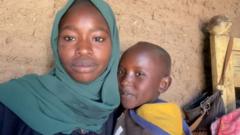Despite calls for mass protests against President Mnangagwa, Zimbabwe has largely come to a standstill as residents avoid conflict, highlighting a deeply divided political landscape.
**Zimbabweans Embrace Shutdown Over Protest Pressures**

**Zimbabweans Embrace Shutdown Over Protest Pressures**
Citizens opt for safety over dissent as heavy police presence curbs turnout.
A national protest aimed at pressuring Zimbabwean President Emmerson Mnangagwa to resign has transitioned into a widespread shutdown, with most citizens choosing to remain indoors rather than risk confrontation. The anticipated demonstration was primarily led by a faction of disgruntled war veterans, alleging Mnangagwa's corruption and attempts to maintain power. However, only a few brave demonstrators were visible, quickly facing police dispersal tactics.
While calling on Zimbabweans "not to be cowards", protest leader Blessed Geza expressed disappointment at the turnout, despite earlier pleas for a massive turnout to force the president's resignation. Geza, who is advocating for Vice-President Constantine Chiwenga to succeed Mnangagwa, has been vocal in his condemnation of the sitting president, who ascended to power in 2017 after a coup ousted long-term leader Robert Mugabe.
Throughout the day, social media captured several instances of police action against what many considered peaceful protests, including the use of tear gas to scatter crowds. Accounts from demonstrators revealed widespread frustration, particularly among the elderly and caregivers trying to make ends meet in the challenging economic landscape.
Despite an official narrative downplaying the severity of the situation, political analysts interpret the shutdown as a significant political gesture. Reports indicated that in multiple urban areas, shops closed up, streets cleared of vendors, and public transport services dwindled as apprehensive citizens opted for safety amid a significant police presence.
The clergy has cautioned against the potential for unrest, urging calm in the face of frustrations. Core issues underpinning the protests revolve around the rumored intentions of President Mnangagwa to extend his term to 2030, which has raised eyebrows among opposition groups and citizens alike.
While the president insists he will not extend his term, skepticism remains widespread, igniting further discord and heightened demands for change. As tensions mount, the narrative surrounding Mnangagwa's leadership continues to evolve, with many watching closely to see how events unfold in this politically fragile nation.





















